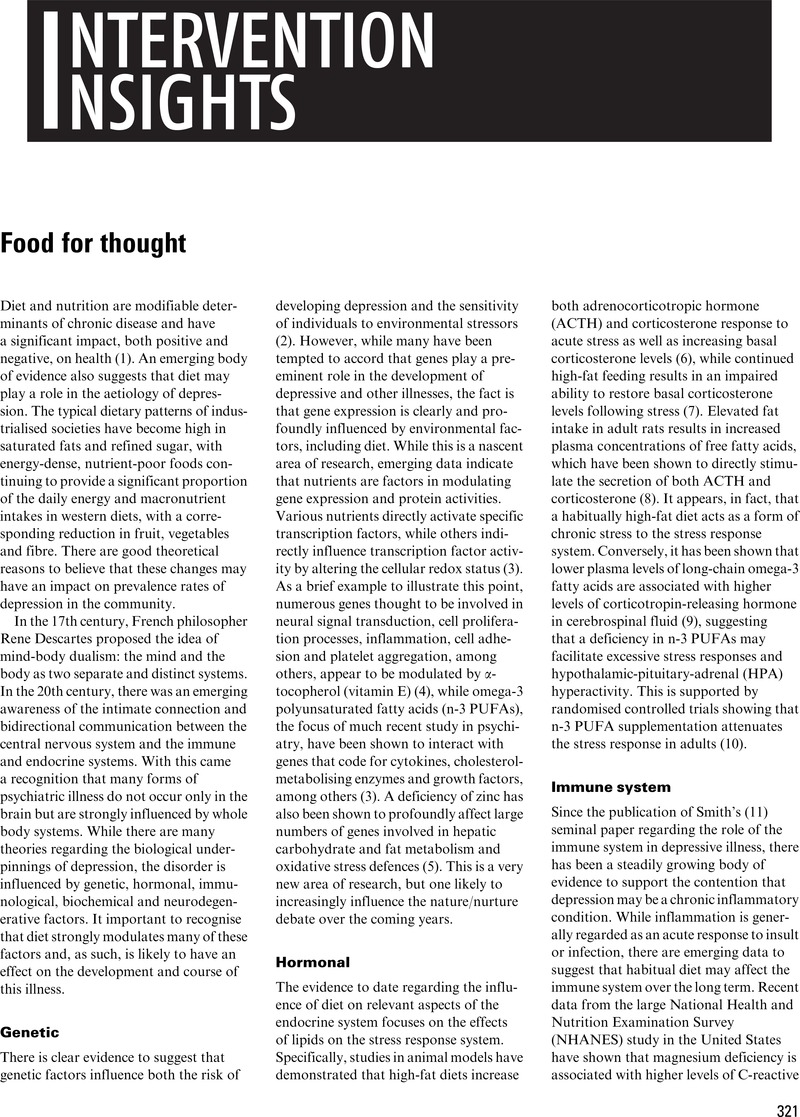Crossref Citations
This article has been cited by the following publications. This list is generated based on data provided by Crossref.
Jacka, Felice N.
Gama, Clarissa S.
and
Berk, Michael
2008.
Brain-derived neurotrophic factor: a modifiable common mediator in both the pathophysiology of psychiatric illness and in successful pharmacological treatments.
Acta Neuropsychiatrica,
Vol. 20,
Issue. 4,
p.
223.
Guimarães, Lísia Rejane
Jacka, Felice N.
Gama, Clarissa Severino
Berk, Michael
Leitão-Azevedo, Carmen Lúcia
Belmonte de Abreu, Martha Guerra
Lobato, Maria Inês
Andreazza, Ana Cristina
Ceresér, Keila Maria
Kapczinski, Flávio
and
Belmonte-de-Abreu, Paulo
2008.
Serum levels of brain-derived neurotrophic factor in schizophrenia on a hypocaloric diet.
Progress in Neuro-Psychopharmacology and Biological Psychiatry,
Vol. 32,
Issue. 6,
p.
1595.
Jacka, Felice
Mykletun, Arnstein
and
Berk, Michael
2009.
Examining the Role of Nutrition in Mental Health: Issues and Rationale.
Australian & New Zealand Journal of Psychiatry,
Vol. 43,
Issue. 10,
p.
976.
Gambrel, Joshua Colt
and
Cafaro, Philip
2009.
Virtue Ethics and the Environment.
p.
85.
Jacka, Felice N.
Overland, Simon
Stewart, Robert
Tell, Grethe S.
Bjelland, Ingvar
and
Mykletun, Arnstein
2009.
Association Between Magnesium Intake and Depression and Anxiety in Community-Dwelling Adults: The Hordaland Health Study.
Australian & New Zealand Journal of Psychiatry,
Vol. 43,
Issue. 1,
p.
45.
Soh, Nerissa L
Walter, Garry
Baur, Louise
and
Collins, Clare
2009.
Nutrition, mood and behaviour: a review.
Acta Neuropsychiatrica,
Vol. 21,
Issue. 5,
p.
214.
Jacka, Felice N.
Kremer, Peter J.
Leslie, Eva R.
Berk, Michael
Patton, George C.
Toumbourou, John W.
and
Williams, Joanne W.
2010.
Associations Between Diet Quality and Depressed Mood in Adolescents: Results from the Australian Healthy Neighbourhoods Study.
Australian & New Zealand Journal of Psychiatry,
Vol. 44,
Issue. 5,
p.
435.
Jacka, Felice N.
Pasco, Julie A.
Mykletun, Arnstein
Williams, Lana J.
Hodge, Allison M.
O'Reilly, Sharleen Linette
Nicholson, Geoffrey C.
Kotowicz, Mark A.
and
Berk, Michael
2010.
Association of Western and Traditional Diets With Depression and Anxiety in Women.
American Journal of Psychiatry,
Vol. 167,
Issue. 3,
p.
305.
Gambrel, Joshua Colt
and
Cafaro, Philip
2010.
The Virtue of Simplicity.
Journal of Agricultural and Environmental Ethics,
Vol. 23,
Issue. 1-2,
p.
85.
Jacka, Felice N.
Mykletun, Arnstein
Berk, Michael
Bjelland, Ingvar
and
Tell, Grethe S.
2011.
The Association Between Habitual Diet Quality and the Common Mental Disorders in Community-Dwelling Adults.
Psychosomatic Medicine,
Vol. 73,
Issue. 6,
p.
483.
Jacka, Felice N.
Pasco, Julie A.
Mykletun, Arnstein
Williams, Lana J.
Nicholson, Geoffrey C.
Kotowicz, Mark A.
and
Berk, Michael
2011.
Diet quality in bipolar disorder in a population-based sample of women.
Journal of Affective Disorders,
Vol. 129,
Issue. 1-3,
p.
332.
Derom, Marie-Laure
Martínez-González, Miguel AÁ.
Sayón-Orea, Maria del Carmen
Bes-Rastrollo, Maira
Beunza, Juan J.
and
Sánchez-Villegas, Almudena
2012.
Magnesium Intake Is Not Related to Depression Risk in Spanish University Graduates.
The Journal of Nutrition,
Vol. 142,
Issue. 6,
p.
1053.
Jacka, Felice N
Mykletun, Arnstein
and
Berk, Michael
2012.
Moving towards a population health approach to the primary prevention of common mental disorders.
BMC Medicine,
Vol. 10,
Issue. 1,
O’Neil, Adrienne
Berk, Michael
Itsiopoulos, Catherine
Castle, David
Opie, Rachelle
Pizzinga, Josephine
Brazionis, Laima
Hodge, Allison
Mihalopoulos, Cathrine
Chatterton, Marya Lou
Dean, Olivia M
and
Jacka, Felice N
2013.
A randomised, controlled trial of a dietary intervention for adults with major depression (the “SMILES” trial): study protocol.
BMC Psychiatry,
Vol. 13,
Issue. 1,
Jacka, Felice N.
Ystrom, Eivind
Brantsaeter, Anne Lise
Karevold, Evalill
Roth, Christine
Haugen, Margaretha
Meltzer, Helle Margrete
Schjolberg, Synnve
and
Berk, Michael
2013.
Maternal and Early Postnatal Nutrition and Mental Health of Offspring by Age 5 Years: A Prospective Cohort Study.
Journal of the American Academy of Child & Adolescent Psychiatry,
Vol. 52,
Issue. 10,
p.
1038.
Derom, Marie-Laure
Sayón-Orea, Carmen
Martínez-Ortega, José María
and
Martínez-González, Miguel A.
2013.
Magnesium and depression: a systematic review.
Nutritional Neuroscience,
Vol. 16,
Issue. 5,
p.
191.
McMartin, Seanna E.
Willows, Noreen D.
Colman, Ian
Ohinmaa, Arto
Storey, Kate
and
Veugelers, Paul J.
2013.
Diet Quality and Feelings of Worry, Sadness or Unhappiness in Canadian Children.
Canadian Journal of Public Health,
Vol. 104,
Issue. 4,
p.
e322.
McMartin, Seanna E.
Jacka, Felice N.
and
Colman, Ian
2013.
The association between fruit and vegetable consumption and mental health disorders: Evidence from five waves of a national survey of Canadians.
Preventive Medicine,
Vol. 56,
Issue. 3-4,
p.
225.
Berk, M.
Sarris, J.
Coulson, C. E.
and
Jacka, F. N.
2013.
Lifestyle management of unipolar depression.
Acta Psychiatrica Scandinavica,
Vol. 127,
Issue. s443,
p.
38.
Sanhueza, C.
Ryan, L.
and
Foxcroft, D. R.
2013.
Diet and the risk of unipolar depression in adults: systematic review of cohort studies.
Journal of Human Nutrition and Dietetics,
Vol. 26,
Issue. 1,
p.
56.



